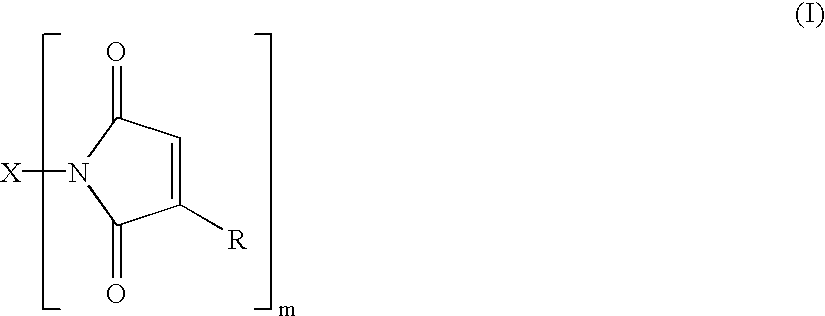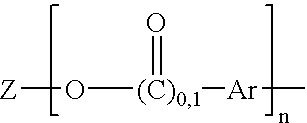Thermosetting resin compositions containing maleimide and/or vinyl compounds
a technology of resin compositions and maleimides, which is applied in the field of thermosetting resin compositions, can solve the problems of difficulty compounding, moisture uptake, and inability to formulate bismaleimide compositions
- Summary
- Abstract
- Description
- Claims
- Application Information
AI Technical Summary
Benefits of technology
Problems solved by technology
Method used
Image
Examples
example 1
[0098]Preparation of the bismaleimide of hydrogenated dimer acid diamine (Henkel Corp. Versamine 552) by closure of the bismaleamic acid with acetic anhydride to a mixture of isomaleimide and maleimide, followed by isomerization of the isomaleimide to maleimide with 1-hydroxybenzotriazole (HOBt) under mild conditions. A solution of 30.0 g of Versamine 552 in 90 mL of anhydrous tetrahydrofuran (THF) was slowly added to a solution of 12.5 g of maleic anhydride in 60 mL of THF. One hour after completion of the addition, 125 mL of acetic anhydride was added and the reaction mixture stirred overnight under argon atmosphere.
[0099]A Fourier transform infrared attenuated total reflectance (FTIR ATR) spectrum indicated substantial conversion of the amic acid to the isoimide, with little if any amide. The reaction mixture was brought to reflux and maintained there for three hours. FTIR now indicated a mixture of isoimide and maleimide with the former apparently (uncalibrated spectrum) predomi...
example 2
[0102]Bismaleamic acid was generated from 10.0 g of Versamine 552 and 3.9 g of maleic anhydride, each in 40 mL of THF. 2-Ethoxy-1-ethoxycarbonyl-1,2-dihydroquinoline (EEDQ), 9.3 g, was added. Monitoring by FTIR indicated that two days sufficed to effect essentially complete conversion to isomaleimide. HOBt, 4.9 g, was dissolved in the reaction mixture. Monitoring by FTIR indicated that six hours sufficed to convert all the isoimide to imide. The solvent was stripped off and the residue extracted with pentane to yield 6.0 g of product bismaleimide, contaminated with quinoline from the EEDQ.
example 3
[0103]E. C. Martin and A. A. DeFusco, in U.S. Statutory Invention Registration No. H424 (Feb. 2, 1988) teach the preparation of bismaleimide from “dimer diamine” (source not given but material NOT having had the olefinic unsaturation removed) by means of HOBt and DCC. However, the maximum yield of bismaleimide reported is 50%. Thus, following the procedure of Martin and Fusco, the bismaleimide of Versamine 552 (Henkel Corp.) was prepared using dicyclohexylcarbodiimide (DCC) and 1-hydroxybenzotriazole (HOBt). A solution of 50.0 g (0.179 amine equiv) of Versamine 552 in 60 mL of anhydrous tetrahydrofuran (THF) was added slowly under argon atmosphere to a solution of 20.2 g (0.206 mole) of maleic anhydride in 300 mL of THF. The reaction mixture was stirred for an hour after completion of the addition and then 25.2 g (0.186 mole) of HOBt (2O) was dissolved in. The stirred reaction mixture was chilled in an ice bath and melted DCC added neat in portions to a total of 49.2 g (0.238 mole)....
PUM
| Property | Measurement | Unit |
|---|---|---|
| viscosity | aaaaa | aaaaa |
| viscosity | aaaaa | aaaaa |
| temperatures | aaaaa | aaaaa |
Abstract
Description
Claims
Application Information
 Login to View More
Login to View More - R&D
- Intellectual Property
- Life Sciences
- Materials
- Tech Scout
- Unparalleled Data Quality
- Higher Quality Content
- 60% Fewer Hallucinations
Browse by: Latest US Patents, China's latest patents, Technical Efficacy Thesaurus, Application Domain, Technology Topic, Popular Technical Reports.
© 2025 PatSnap. All rights reserved.Legal|Privacy policy|Modern Slavery Act Transparency Statement|Sitemap|About US| Contact US: help@patsnap.com



